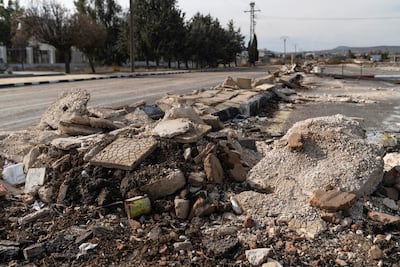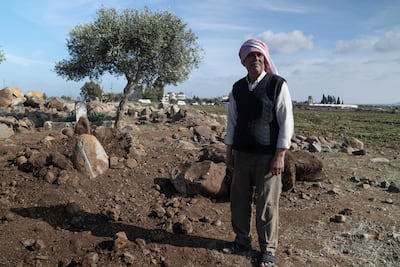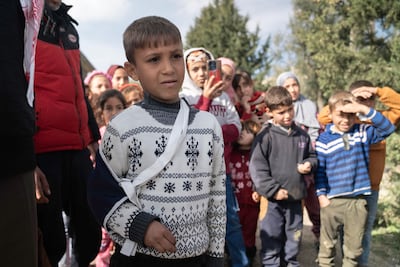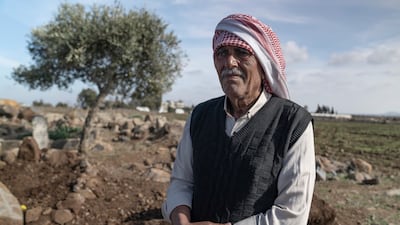Abdo Ali Al Kouma was the backbone of his family in the small Syrian farming village of Ghadir Al Bustan, a cluster of low-slung houses surrounded by dry stone walls, fruit trees and flowers. All that changed on January 15, when the effects of a continuing Israeli military campaign in southern Syria reached the small community.
The farmer and livestock rearer, 74, was killed in an Israeli air strike on Ghadir Al Bustan, in Al Quneitra province just outside a buffer zone established between Syria and the Israeli-occupied Golan Heights in the 1970s. The strike also injured several members of Syria’s new security troops, who were patrolling through the village on vehicles carrying weapons.
“He was a very social person, a figure in the community – well-known, pure and generous,” Mutarad Al Hilal Al Kouma, Abdo Ali’s nephew, 64, told The National. “He would sort things out if there were problems between us. He was the ‘commander’ of the family.”
Since the fall of former president Bashar Al Assad's regime last month, the Israeli military has advanced and, for the first time in 50 years, has taken control of territory in a UN-patrolled, supposedly demilitarised, zone set up as part of a 1974 ceasefire agreement between Syria and Israel.
In some towns and villages, troops carry out search operations before retreating. In a string of others, it has taken over and set up military bases in former Syrian government buildings, as Israeli Prime Minister Benjamin Netanyahu’s government says it needs to secure Israel’s borders and erase weapons stockpiles left by the Assad’s regime and its allies. It has also carried out ground incursions and strikes such as the one at Ghadir Al Bustan in Syrian territory outside the 235 square kilometre buffer zone.

The National witnessed several Israeli military convoys patrolling the demilitarised area, including one on top of a dam, and another as it left the former court building in Al Salaam City, formerly Al Baath City and renamed after Mr Al Assad’s fall. The town has been partially occupied by Israeli troops, with other areas patrolled by the General Security troops of the new authorities in Damascus.
For civilians in southern Syria, the Israeli attacks and military operations come as another devastating blow after years of conflict. Mr Al Kouma had been offering coffee to the passing Syrian security troops outside his home when an Israeli drone and warplanes flew overhead, Mutarad Al Kouma told The National from the site where the road was struck on January 15.
“He was standing, pouring coffee for the men, he was carrying a Thermos flask. The missile hit the ground, and he died immediately,” Mr Al Kouma explained.
“Two of the men were also hit. We took them to hospital, as we did for the martyr. The shrapnel flew right up to the house – those white marks on the wall,” he said, pointing to white pockmarks on the walls of his uncle’s home nearby.

The National interviewed four witnesses of the attack, including Mr Al Kouma, who described how, after hours of drone surveillance, two Israeli warplanes flew over the village at about 3.40pm on January 15, accompanied by a drone that dropped the munition. It made a small hole in the road and disappeared into the sewerage system without exploding, the witnesses said. They all described how the aerial attack had taken place in the late afternoon, as children were playing out in the same street.
Among those injured is Omar Al Kouma, 10, who wears a blue sling on his right arm after shrapnel hit and broke a bone in his shoulder, his father Mahmoud Al Kouma, 34, a local labourer, told The National.
“They [the Israelis] are acting as if it’s their country,” Mr Al Kouma said. If they wanted to target weapons, he added, “they should do it outside of areas where there are people living – there are children here.”
Abdo Ali’s closest relatives remain visibly grief-stricken. “We had just succeeded in the revolution [against Assad], and thanks to God none of our family was killed then,” said Hend Al Kouma, 31, one of Abdo Ali’s eight children. “And then the Israelis come and do this.”

The Israeli military told The National that it “was aware” of reports of civilian harm in the strike but “could not confirm these allegations” and said it took all feasible precautions to mitigate civilian harm.
In an earlier public statement, an Israeli military spokesman confirmed that an Israeli aircraft had fired near vehicles carrying weapons near the buffer zone in southern Syria “to push them away”.
The wider Israeli operation in southern Syria is the latest in a long and complex history of conflict and tension between the neighbouring countries. It has stoked fears among Syrians that Israel is attempting to build on its decades-long control of the Golan Heights, a plateau that Israel captured from Syria in the 1967 Arab-Israeli War. Most countries consider its presence there a unilateral annexation, although the US recognised Israeli control of the area in 2019.
On December 8, the same day as Mr Al Assad fled Damascus for Russia, Mr Netanyahu said he gave orders to the Israeli army to take over positions abandoned by Mr Al Assad’s army in the buffer zone.
“We will stay … until another arrangement is found to ensure Israel’s security,” the Israeli leader said in later remarks.
Mr Netanyahu justified the move by saying that the fall of the Assad regime meant the collapse of the 1974 ceasefire agreement between the neighbouring countries. The Israeli military confirmed to The National that it is operating within the buffer zone, and, “in several additional locations in its proximity to ensure the security of Israel’s northern border”.
Fear and anger
Residents of towns inside the buffer zone, who now live just a few hundred metres from Israeli positions, and new military outposts set up in the past month, described fear and anger at the Israeli operation.
From his small shop selling fizzy drinks and snacks, Mahmoud Arnous, 30, said Israel had built a new outpost on a hummock known as Tell Al Gharbi, about 1km away.
“When the regime fell, a month and a half ago roughly, they came in,” he told The National. “They have built tracks from Israel on to the hill, and on the top they made a big open space. They are monitoring everything from up there, and they put up pre-fab buildings up there. They won’t leave.”
Local residents do not buy what Israeli military officials tell them about their aims focused on weapons searches and securing the area.
Mohammed Faroukh, 32, a law student, lives in an apartment block about 300 metres from a barrier, a collapsed pole and piles of earth in the road in Al Salaam City - a makeshift demarcation point leading to areas now under Israeli military control. Several members of the new Syrian General Security troops stood in the road at the crossroads, facing the Israeli positions.
The Israelis “are doing this to intimidate the residents”, Mr Faroukh told The National. “We are the ones who will achieve security in Syria, not them.’”
He said people had not attempted to flee the areas now under Israeli military control because they had nowhere else to go, but that friends there said how they were now under strict movement controls.
“They [the Israelis] – give them timings,” he explained. “For example if they want to go to a market, because there isn’t a market there, so if they want to go to [the town of] Khan Arnaba for example to shop, they [the Israelis] tell them that they have from 10am until 1pm, and after that you can neither leave the village nor return.”
Residents of the buffer zone and surrounding villages such as Ghadir Al Bustan are expecting action from Syria’s new authorities to make the Israelis leave the areas they have taken in the past five weeks.
“We want the Israelis to leave our country, nothing more,” said Mr Arnous. “There needs to be negotiations, but nothing has seemed to happen until now.”
The caretaker government in Damascus has the enormous task of rebuilding Syria’s state institutions, writing a new constitution, and repairing the physical destruction brought on the country by over 13 years of conflict. Talks over the Israeli operations in the far south-west are just one task on an almost endless to-do list, and authorities will be unlikely to be able to prioritise it.
Syria’s de facto leader Ahmad Al Shara said on January 16 that Israel’s advance was due to the former build-up of Iran-backed militias including Lebanese Hezbollah in the area, but that those groups were no longer present. “There are pretexts that Israel is using today to advance into the Syrian regions, into the buffer zone.”
In Ghadir Al Bustan, relatives of Abdo Ali Al Kouma just want to be able to live peacefully. The family is demanding that the authorities in Damascus ensure security patrols do not enter villages in the area in ways that could elicit Israeli suspicions and prompt attacks.
“We don’t want money or gold or positions in power,” said Mutarad Al Kouma. “We want enough protection.”


